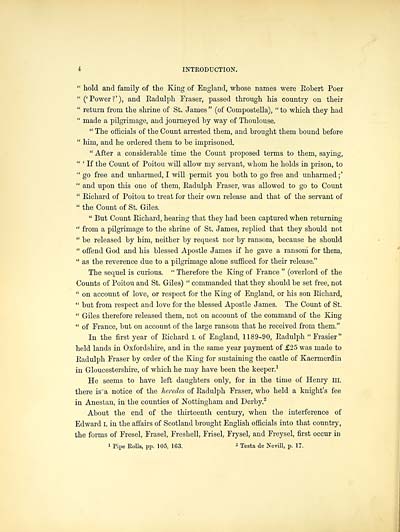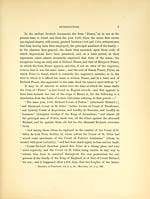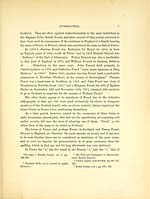Frasers of Philorth > Volume 1
(32)
Download files
Complete book:
Individual page:
Thumbnail gallery: Grid view | List view

4 INTRODUCTION.
" hold and family of the King of England, whose names were Bobert Poer
" ('Power?'), and Eadulph Eraser, passed through his country on their
" return from the shrine of St. James " (of Compostella), " to which they had
" made a pilgrimage, and journeyed by way of Thoulouse.
" The officials of the Count arrested them, and brought them bound before
" him, and he ordered them to be imprisoned.
" After a considerable time the Count proposed terms to them, saying,
" ' If the Count of Poitou will allow my servant, whom he holds in prison, to
" go free and unharmed, I will permit you both to go free and unharmed;'
" and upon this one of them, Eadulph Fraser, was allowed to go to Count
" Kichard of Poitou to treat for their own release and that of the servant of
" the Count of St. Giles.
" But Count Eichard, hearing that they had been captured when returning
" from a pilgrimage to the shrine of St. James, replied that they should not
" be released by him, neither by request nor by ransom, because he should
" offend God and his blessed Apostle James if he gave a ransom for them,
" as the reverence due to a pilgrimage alone sufficed for their release."
The sequel is curious. " Therefore the King of Prance " (overlord of the
Counts of Poitou and St, Giles) " commanded that they should be set free, not
" on account of love, or respect for the King of England, or his son Eichard,
" but from respect and love for the blessed Apostle James. The Count of St.
" Giles therefore released them, not on account of the command of the King
" of France, but on account of the large ransom that he received from them."
In the first year of Eichard I. of England, 1189-90, Eadulph "Frasier"
held lands in Oxfordshire, and in the same year payment of £25 was made to
Eadulph Fraser by order of the King for sustaining the castle of Kaermerdin
in Gloucestershire, of which he may have been the keeper. 1
He seems to have left daughters only, for in the time of Henry in.
there is' a notice of the heredes of Eadulph Fraser, who held a knight's fee
in Anestan, in the counties of Nottingham and Derby. 2
About the end of the thirteenth century, when the interference of
Edward I. in the affairs of Scotland brought English officials into that country,
the forms of Fresel, Frasel, Freshell, Frisel, Frysel, and Freysel, first occur in
1 Pipe Rolls, pp. 105, 163. 2 Testa de Nevill, p. 17.
" hold and family of the King of England, whose names were Bobert Poer
" ('Power?'), and Eadulph Eraser, passed through his country on their
" return from the shrine of St. James " (of Compostella), " to which they had
" made a pilgrimage, and journeyed by way of Thoulouse.
" The officials of the Count arrested them, and brought them bound before
" him, and he ordered them to be imprisoned.
" After a considerable time the Count proposed terms to them, saying,
" ' If the Count of Poitou will allow my servant, whom he holds in prison, to
" go free and unharmed, I will permit you both to go free and unharmed;'
" and upon this one of them, Eadulph Fraser, was allowed to go to Count
" Kichard of Poitou to treat for their own release and that of the servant of
" the Count of St. Giles.
" But Count Eichard, hearing that they had been captured when returning
" from a pilgrimage to the shrine of St. James, replied that they should not
" be released by him, neither by request nor by ransom, because he should
" offend God and his blessed Apostle James if he gave a ransom for them,
" as the reverence due to a pilgrimage alone sufficed for their release."
The sequel is curious. " Therefore the King of Prance " (overlord of the
Counts of Poitou and St, Giles) " commanded that they should be set free, not
" on account of love, or respect for the King of England, or his son Eichard,
" but from respect and love for the blessed Apostle James. The Count of St.
" Giles therefore released them, not on account of the command of the King
" of France, but on account of the large ransom that he received from them."
In the first year of Eichard I. of England, 1189-90, Eadulph "Frasier"
held lands in Oxfordshire, and in the same year payment of £25 was made to
Eadulph Fraser by order of the King for sustaining the castle of Kaermerdin
in Gloucestershire, of which he may have been the keeper. 1
He seems to have left daughters only, for in the time of Henry in.
there is' a notice of the heredes of Eadulph Fraser, who held a knight's fee
in Anestan, in the counties of Nottingham and Derby. 2
About the end of the thirteenth century, when the interference of
Edward I. in the affairs of Scotland brought English officials into that country,
the forms of Fresel, Frasel, Freshell, Frisel, Frysel, and Freysel, first occur in
1 Pipe Rolls, pp. 105, 163. 2 Testa de Nevill, p. 17.
Set display mode to:
![]() Universal Viewer |
Universal Viewer | ![]() Mirador |
Large image | Transcription
Mirador |
Large image | Transcription
Images and transcriptions on this page, including medium image downloads, may be used under the Creative Commons Attribution 4.0 International Licence unless otherwise stated. ![]()
| Histories of Scottish families > Frasers of Philorth > Volume 1 > (32) |
|---|
| Permanent URL | https://digital.nls.uk/96565884 |
|---|
| Attribution and copyright: |
|
|---|
| Description | A selection of almost 400 printed items relating to the history of Scottish families, mostly dating from the 19th and early 20th centuries. Includes memoirs, genealogies and clan histories, with a few produced by emigrant families. The earliest family history goes back to AD 916. |
|---|

